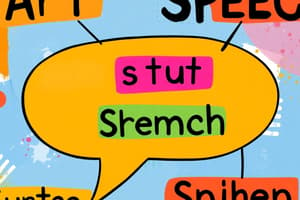Podcast
Questions and Answers
Quais são os nomes de pessoas, lugares, organizações ou títulos?
Quais são os nomes de pessoas, lugares, organizações ou títulos?
- Substantivos concretos
- Substantivos comuns
- Substantivos próprios (correct)
- Substantivos abstratos
Quais são os termos gerais para pessoas, lugares, coisas ou ideias?
Quais são os termos gerais para pessoas, lugares, coisas ou ideias?
- Substantivos comuns (correct)
- Substantivos abstratos
- Substantivos concretos
- Substantivos coletivos
Quais substantivos se referem a objetos ou substâncias tangíveis?
Quais substantivos se referem a objetos ou substâncias tangíveis?
- Substantivos coletivos
- Substantivos concretos (correct)
- Substantivos próprios
- Substantivos abstratos
Quais substantivos se referem a conceitos ou sentimentos intangíveis?
Quais substantivos se referem a conceitos ou sentimentos intangíveis?
Quais são os grupos de pessoas, animais ou coisas?
Quais são os grupos de pessoas, animais ou coisas?
O que é um substantivo comum?
O que é um substantivo comum?
Qual é o exemplo de um substantivo coletivo?
Qual é o exemplo de um substantivo coletivo?
O que é um substantivo abstrato?
O que é um substantivo abstrato?
Qual é o exemplo de um substantivo concreto?
Qual é o exemplo de um substantivo concreto?
Por que os substantivos próprios são sempre capitalizados?
Por que os substantivos próprios são sempre capitalizados?
O que é um substantivo que se refere a uma pessoa, lugar ou organização específica?
O que é um substantivo que se refere a uma pessoa, lugar ou organização específica?
Flashcards are hidden until you start studying
Study Notes
Nouns
Types of Nouns
Proper Nouns
- Names of specific people, places, organizations, or titles
- Always capitalized in writing
- Examples: John, London, Google, President
Common Nouns
- General terms for people, places, things, or ideas
- Not capitalized in writing (unless at the beginning of a sentence)
- Examples: city, teacher, dog, freedom
Concrete Nouns
- Refer to tangible objects or substances
- Can be perceived through the senses (sight, touch, taste, smell, hearing)
- Examples: chair, apple, car, water
Abstract Nouns
- Refer to intangible concepts or feelings
- Cannot be perceived through the senses
- Examples: happiness, freedom, love, anger
Collective Nouns
- Groups of people, animals, or things
- Can be concrete or abstract
- Examples: family, team, flock, crowd
Studying That Suits You
Use AI to generate personalized quizzes and flashcards to suit your learning preferences.




